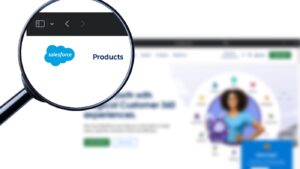- Adam Mansfield
- Reading Time: 5 minutes

One thing was abundantly clear after attending Dreamforce and listening to Salesforce’s recent earnings call: all Salesforce customers need to brace themselves for what may be the most aggressive push for new product adoption that Salesforce has ever made. That product is Salesforce Agentforce.
In this blog, I will give a brief overview into what Agentforce is, why it is so important to Salesforce, how it is priced, and what key questions need to be asked of Salesforce before any commitment is made.

What is Salesforce Agentforce?
Per Salesforce, Agentforce is a proactive, autonomous application that provides specialized, 24/7 support to employees or customers that are equipped with the necessary business knowledge to execute tasks according to their specific role. This allows for re-prioritizing bandwidth towards work that may be deemed “higher priority.”
Agentforce “agents” use large language models (LLMs) to analyze and understand the full context of customer interactions or an automated trigger, then reason through decisions on the next steps autonomously. It’s designed to work with humans as partners in the customer experience. For example, an agent can provide a new sales representative with a personal sales coach to help them learn and improve.
The application integrates with Salesforce’s existing automation capabilities, including MuleSoft, Salesforce Flow, and Apex methods. It also uses Data Cloud to access customer data and metadata across systems in real time. The application is built on existing AI capabilities, like Copilot and GPT, and is directly tied to the Airkit.AI acquisition that happened in October 2023.
Atlas Reasoning Engine is the “brain” behind Agentforce. If you attended Dreamforce, you heard Benioff mention this many times during the opening Keynote address. Expect your Salesforce account executive to mention it as well.
How is Agentforce Priced?
Agentforce will not be priced on a “per user” basis, but rather on a consumption basis. The list price is $2 per conversation, thought Salesforce has said that “standard volume discounts apply.” Salesforce is also expected to sell “consumption credits” and “credit packs.”
Based on reports out there, Agentforce and it’s agents are supposed to capture the value of a $50K per year service agent. So, at $2 per conversation, that would equate to roughly 25,000 conversations a year covered by that service agent. Of course, Salesforce customers should be asking themselves if those numbers line up with your service agent activity heading into your Salesforce negotiations.
During Dreamforce, Salesforce also announced the rollout of Salesforce Foundations, a group of added features/upgrades to their core products like Sales, Service, Marketing, and Commerce. They also announced that if you are an Enterprise level or higher customer, you get these new features as part of a “free upgrade.”
This upgrade also includes the use of Agents and Agent & Prompt Builders. Customers get up to 1000 conversations, 1000 leads and one sales coach. Once customers start consuming and the flywheel starts to spin, they will now have to start paying for continued use. My assumption is that Salesforce knows customers will burn through these initial allotted amounts.
Why is Salesforce Pushing Agentforce?
There are several key reasons why Salesforce is focused on pushing Agentforce moving forward. First, as the AI market continues to evolve and AI agents emerge as a key tool in the industry, Salesforce wants to establish themselves as the AI agent leader on the market.
Many of the big enterprise vendors out there are also pushing their AI “agents” offerings:
- Microsoft made their Microsoft 365 Copilot Wave 2 announcement the day before Dreamforce, which included “Copilot Agents”
- ServiceNow’s recent Xanadu release included AI Agents
- Oracle’s annual Cloud World conference covered AI Agents
- Google Cloud is talking about the opportunity to monetize “agentic AI”
Salesforce also wants to increase their revenue and customer’s annual contract value (ACV) by getting customers to adopt more products into their Salesforce portfolios. Because Agentforce is consumption-based, the effect of adoption has a flywheel effect, both increasing spend immediately and in the long-term as customers consume more and more.
Lastly, pushing Agentforce on customers can help increase adoption of Data Cloud among customers. Agentforce is said to perform better when customers use Data Cloud to ensure the agents are working with accurate and up-to-date information, so it is likely we will see Salesforce pushing these products as a “package deal.”
To understand the importance of Agentforce to Salesforce, look no further then at what Salesforce CEO, Marc Benioff recently said to the investment community during the recent FY25 Q2 Earnings call:
- “Agentforce is going to be fundamental to our future and a manifestation of a decade of AI leadership.”
- “I assure you that within a year, we’re going to have agent forces and we’re going to have them at scale.”
- “Thousands of customers will be using Agentforce by beginning of next fiscal year… By end of FY26 (January 2026), we will have 1 Billion agents.”
Based on this, you must imagine Salesforce’s sales executives and leadership got a clear directive to get customers using Agentforce before their next renewal.
It’s Not Just Agentforce – Salesforce Will Be Pushing Data Cloud
In addition to Agentforce, Salesforce’s Data Cloud offering will also be pushed by Salesforce. It is being set up as a crucial component to the story because it is needed to enhance the value customers get from Agentforce. Data Cloud allows customers to integrate, manage, and analyze data from various sources. According to Salesforce, here’s how Data Cloud and Agentforce work together:
- Unified Data View: Data Cloud aggregates data from different systems, giving you a comprehensive view of your sales activities. This unified data helps Agentforce provide more accurate and actionable insights.
- Enhanced Analytics: With a richer dataset, Agentforce can leverage advanced analytics to identify patterns and trends, helping you make data-driven decisions.
- Improved Reporting: Data Cloud enhances the reporting capabilities of Agentforce by providing detailed and customizable reports. This allows sales managers to track performance metrics more effectively.
Salesforce’s pitch will likely be that Agentforce should be used alongside Data Cloud for the best results from the significant investments being made. As such, if you’re a customer looking to utilize Agentforce who has not adopted Data Cloud, expect your Salesforce account executive to push heavily for Data Cloud to also be added to your portfolio in order to get the most out of Agentforce.
This will also increase your ACV, which is another great win for Salesforce and your Salesforce account executive as they look to get back to double-digit revenue growth.
What Should You Be Asking for From Salesforce?
As you consider whether Agentforce is a good fit to add to your Salesforce portfolio, you should ensure you get answers to the following questions from Salesforce:
- Is the pricing for Agentforce really $2 per conversation?
- Can you purchase “conversations” in “bulk” amounts at a discounted price?
- What is considered a conversation? What is considered a lead?
- Will we need to also adopt and pay for Data Cloud? If yes, how much is Data Cloud and how is it priced?
- Is there an SLA or commitment Salesforce is willing to make to ensure value is received from Agentforce? What happens if that value is not realized? Credit? Refund?
- Will Salesforce provide funding or investments to ensure a successful rollout of Agentforce?
- Can you offer no-cost proof of concepts (POCs)? How many use cases would be covered?
- How many customers have started to Agentforce and what have their results been? Can you give me examples that would be relevant to my industry and particulars?
And for all the customers out there that are using Enterprise or higher editions and have access to Agents through Salesforce Foundations, here are a few more questions:
- We noticed there are limits to what we get for free (1K conversations / 1K leads / 1 Sales Coach to get customers started), what happens when we eclipse these thresholds?
- We saw somewhere that one conversation costs $2, is that correct?
- How much does it cost for more leads?
The Bottom Line
Understanding what Agentforce is and why Salesforce is pushing it as hard as they are can help you make informed decisions and ensure you have the right negotiation strategy in place to achieve the right outcome. Remember to use your leverage points effectively during negotiations whether in-term or at renewal to get the best deal possible. By staying informed and prepared, you can maximize the value you get from Salesforce.
For a more in-depth discussion on negotiating with Salesforce, join our upcoming webinar on October 30th to hear actionable negotiation insights from our team of Salesforce expert advisors. Save your spot here.
Related Blogs
How Salesforce Can Accelerate Growth in 2026: Start by Easing Up and Listening
Don’t Let Divestitures Undermine Your Salesforce Negotiation
SaaS Price Increases: What If Vendors Only Charged More When You Got More?
About the Author

